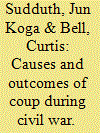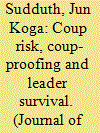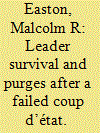| Srl | Item |
| 1 |
ID:
154740


|
|
|
|
|
| Summary/Abstract |
Though approximately one in four coup attempts takes place during an ongoing civil war, scholars have not yet analyzed how the incidence of civil war affects coup attempts and outcomes. We conduct the first empirical analysis of the relationship between ongoing civil war and coup activity, finding (1) war increases the risk of a coup attempt, though (2) war-time coup attempts are significantly less likely to be successful, and (3) the risk of war-time coup is much higher when states face stronger rebel groups that pose greater threats to the political survival of the incumbent government. We attribute these findings to the pernicious effect of ongoing war on the welfare of the military elites and soldiers who have the greatest capacity to execute a coup attempt. As war diminishes their welfare and creates uncertainty about the future of the state, potential plotters become more willing to accept riskier coup attempts than they might plot during peace-time. Coup motivations are greatest when incumbents are more likely to lose their wars, and this causes coup plotters to attempt more and riskier coups when rebels are relatively strong.
|
|
|
|
|
|
|
|
|
|
|
|
|
|
|
|
| 2 |
ID:
151112


|
|
|
|
|
| Summary/Abstract |
Under what conditions do political leaders enact ‘coup-proofing’ strategies? There is a broad consensus in the literature that political leaders who face a higher risk of a coup will employ coup-proofing strategies that reduce the military’s capabilities to organize a coup. A closer look at the theory and empirical analyses of earlier studies, however, suggests that the presumed relationship between coup risk and coup-proofing should be re-examined. Drawing on insights from formal studies of authoritarian power-sharing, this article proposes that political leaders become less likely to initiate coup-proofing efforts as the coup risk increases. The reason is that leaders’ coup-proofing actions in themselves could prompt the military to launch a coup and thus political leaders will hesitate to offend officers when they face a high risk of a coup. The statistical models in this article estimate a latent coup risk by aggregating multiple indicators that capture the military’s willingness and ability to organize a coup. The empirical results strongly support the proposition that coup-proofing efforts taken by leaders decrease as coup risk increases.
|
|
|
|
|
|
|
|
|
|
|
|
|
|
|
|
| 3 |
ID:
184205


|
|
|
|
|
| Summary/Abstract |
The premier data on leader survival focus on the violent, dramatic means by which leaders ‘exit’ office. This information, vital for many research questions, constitutes a valuable public good for the community. Yet, it provides an incomplete picture of the political rise and fall of world leaders. The burgeoning study of leaders using survival analysis requires a fine-grained understanding of not just when, but why and how leaders lose power. We cannot, for example, conclude that a leader’s exit implies a successful application of international pressure if her removal stems from pre-set constitutional laws and the immediate successor has long been considered the heir apparent. The Regular Turnover Details dataset remedies this problem. Two principal variables report information about the manner of each leader’s exit and the relationship between outgoing and incoming leaders, allowing analysts to arbitrate between exits that suggest political failure and those that don’t, identify non-political leaders (such as interim and technocratic executives), and determine whether leaders constitute heirs to power or challengers thereto.
|
|
|
|
|
|
|
|
|
|
|
|
|
|
|
|
| 4 |
ID:
161550


|
|
|
|
|
| Summary/Abstract |
What factors explain variation in the tenure of political leaders who survive a coup d’état? Our main hypothesis is that leaders who survive a coup attempt take the opportunity to purge known and potential rivals while also deterring future coup conspirators. The severity of the purge is also hypothesized to be positively associated with longer post-coup tenures, as potential rivals are eliminated or deterred from future coup attempts. After introducing the topic of the failed coup, and presenting the dataset we developed to measure the level of punishment associated with a failed coup attempt, we offer an analysis of the effect of purges on the survival time of leaders who survive a coup attempt. We find that, conditional on regime type, purging has an effect on lengthening leader tenure, with more severe purges being associated with longer authoritarian tenures. Democratic leaders gain no advantage. Changes in military expenditures do not increase subsequent tenure. We conclude with a discussion of the results as well as what a broader dataset might reveal.
|
|
|
|
|
|
|
|
|
|
|
|
|
|
|
|